Basilosauridae
Member
I recently posted about upgrading from a Shure SM58 to an EV RE20 for voice over. I really like the EV RE20 overall and will keep using it, but I do think some of the nuance is lost with it and most VO most people recommend a condenser mic, so I'm thinking of adding one to my gear collection.
The two most recommended condenser mics in my price range are the Rode NT1 and Sennheiser MK4... thoughts? I am a woman with I guess a medium to low voice, which is why I chose the EV RE20 as my last purchase... which of these condenser mics do you think would sound better with a woman's voice? I also understand that a condenser mic will be less forgiving than the EV RE20...can anyone help me understand exactly what that means and why that is?
Also, is there anything I should do different with my recording space for a condenser vs the cardiod mic?
Thanks! All thoughts and feedback are appreciated.
The two most recommended condenser mics in my price range are the Rode NT1 and Sennheiser MK4... thoughts? I am a woman with I guess a medium to low voice, which is why I chose the EV RE20 as my last purchase... which of these condenser mics do you think would sound better with a woman's voice? I also understand that a condenser mic will be less forgiving than the EV RE20...can anyone help me understand exactly what that means and why that is?
Also, is there anything I should do different with my recording space for a condenser vs the cardiod mic?
Thanks! All thoughts and feedback are appreciated.

